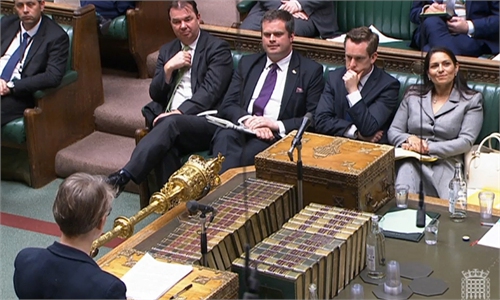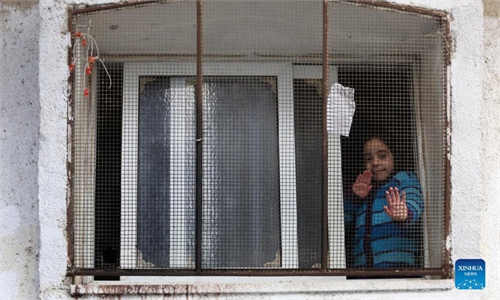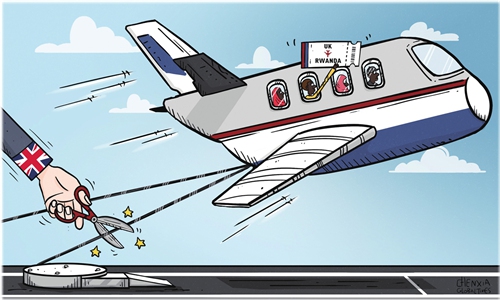IN-DEPTH / IN-DEPTH
Global refugee figure surpasses 100 million mark, over half directly caused by US-waged wars
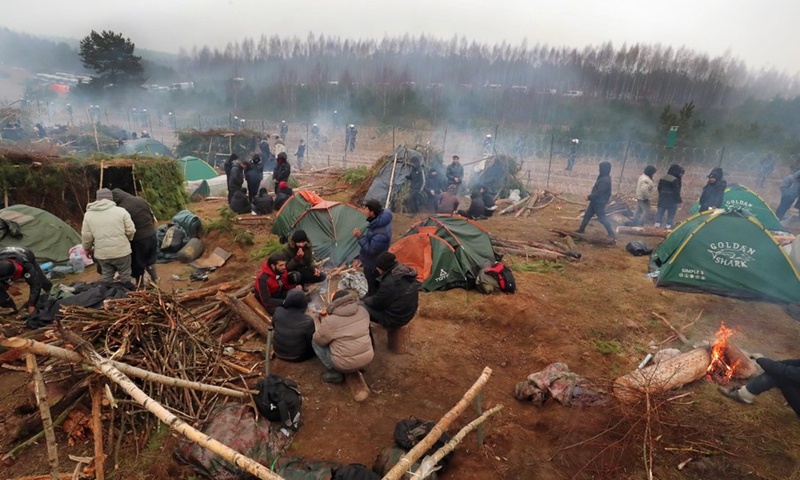
Photo taken on Nov. 14, 2021 shows a refugee camp near the Belarusian-Polish border in Belarus. Photo: Xinhua
The 22nd World Refugee Day on June 20 came with a sad message this year. The number of refugees forced to flee their homes has surpassed the staggering 100 million mark for the first time in human history, according to a recent report released by the United Nations High Commissioner for Refugees (UNHCR).One hundred million is a stark figure, sobering and alarming in equal measure. It is a record that should never have been set. This must serve as a wake-up call to resolve and prevent conflicts, end persecution and address the underlying causes that force innocent people to flee their homes, said the UN High Commissioner for Refugees Filippo Grandi.
Experts and observers reached by the Global Times noted that the flood of refugees is partly caused by poverty and war in the countries of origin, but ultimately, it is the result of the long-term interference by some Western countries led by the US in other countries' internal affairs and the creation of humanitarian disasters.
Western countries led by the US alongside France and the UK have provoked disputes and exported wars globally under the banner of "human rights" and "freedom," depriving countless people of their real human rights and freedom, and forced them to become refugees.
As long as Western countries are actively creating chaos for their own selfish ends, the refugee problem will not be solved, experts said.
Fearmongering
Today, one in every 78 people on earth is displaced. This is a "dramatic milestone" that few would have expected a decade ago, the UNHCR said.
UNHCR Representative to China, Vanno Noupech, spent his first World Refugee Day in China on June 20, saying that the only answer to the refugee crisis is peace and stability.
Who is undermining peace and stability?
According to the UNHCR, the 100 million mark was reached in May, 10 weeks after the Russian-Ukrainian conflict prompted a global cereal and fertilizer shortage.
Since February, the crisis has internally displaced over 8 million people in Ukraine, with more than 6.5 million crossing international borders into neighboring countries, including Poland and Moldova.
Experts pointed out that the root cause of the crisis in Ukraine lies in NATO's moves to encircle and squeeze Russia's security space even after the Cold War.
"Currently, the Western countries respond to the crisis by still sending arms regardless of refugees," Zhou Zhanggui, a research fellow in the Center for Non-Traditional Security and Peaceful Development Studies at Zhejiang University, told the Global Times.
In fact, the increase of global refugees was extremely serious even before the outbreak of the Ukraine crisis.
By the end of 2021, the escalation of several conflicts "and new ones that flared up" led the number of people displaced by war, violence, persecution and human rights abuses to reach 89.3 million, according to the UNHCR report.
Ironically, in retrospect, the US launched the war in Afghanistan just a few months after the international community first established and commemorated World Refugee Day in 2001. Since then, as the US' war on terror has turned more countries into scorched earth, the number of refugees have grown larger.
From waging wars in Iraq and Afghanistan, to the support of anti-government forces in West Asia and North Africa to promote the "Arab Spring," its direct involvement in the War in Syria, and long-term intervention in Venezuela's internal affairs, the continued provocation by Western countries in regional conflicts is the root cause of the refugee crisis, Zhou noted.
A report by the Watson Institute of International Affairs of the Brown University titled "Creating Refugees: Displacement Caused by the United States' Post-9/11 Wars" mentions that the actual number of refugees and displaced people caused by the United States after 9/11 may be as high as 59 million.
"The United States is contributing to the global refugee crisis through its military actions, choice of partners and defiance of international norms," Steven Feldstein, a research fellow at the Carnegie Democracy, Conflict, and Governance Program, commented in an analysis titled "How US policies are worsening the global refugee crisis." More disturbingly, the US behavior could accelerate the collapse of norms and trigger a "global protection crisis," he said.
Deprivation of hope
The UNHCR revealed that currently almost 90 percent of the world's refugees are hosted by developing countries.
In the face of continuing waves of refugees, the instigators of the conflict have ostensibly been generous in accepting refugees through the elaborate lip service in the international community, while behind the scenes, they shifted the aftermath away from them leaving many refugees to starve and in fear in an unstable environment.
Since the start of the Russia-Ukraine conflict, the US promised to accept 100,000 refugees. However, Reuters reported citing US State Department data that the US admitted 514 Ukrainian refugees in January and February, but in the entire month of March, when the conflict between Russia and Ukraine was intensifying, the country received only 12 Ukrainian refugees.
According to US News and the World Report, as early as April, nearly 3,000 Ukrainians were waiting at the US-Mexico border to enter the US.
The status and whereabouts of thousands of Ukrainians there is not officially documented. The US government could have responded adequately to refugee crisis but its actual performance shows that how its refugee policy is implemented depends largely on political will, the report said.
The British government, another example, stands accused of trading people like commodities to send asylum seekers on a one-way ticket to Rwanda, a plan that has since been stalled when the European Court intervened, Al Jazeera reported.
In the 20 years since the US forces invaded Afghanistan in 2001 in the name of counter-terrorism efforts, more than 3.5 million people have been internally displaced while 2.6 million are living in other countries.
Since July 2021, the US Citizenship and Immigration Services has received over 46,000 applications from Afghan refugees hoping to go to the US through the humanitarian parole process. However, as of June 2, only 297 requests from Afghans, or less than 1 percent applications, had been approved.
At the same time, news of the brutal treatment of immigrants and refugees by Western governments are emerging. Extreme measures such as prolonged detention, violent enforcement and forcible removal have become the usual means by which their border enforcement agencies violate the human rights of migrants.
According to a report by Politico, from February 2017 to June 2021, the US-Mexico Border Patrol detained nearly 2 million people of which 650,000 were under 18.
Drawing on interviews with 25,602 minors, four American legal services organizations revealed that children in detention were routinely verbally abused, pushed and kicked by border patrol agents. Even at the height of the COVID-19 outbreak, children with fever, cough and stomachache could not access basic medical care.
Australia, which followed the US in imposing sanctions on Russia and "welcoming Ukrainians," has also been criticized for its appalling treatment of refugees.
In 2001, in order to prevent the entry of 433 refugees from Afghanistan and Iraq on a Norwegian freight ship, Australia sent its special forces to forcibly control the crew. Under international pressure, the Australian government reluctantly took in some of the refugees and put them in solitary detention, but ultimately did not allow any of them to enter the country.
According to ABC News, the conditions of the detention centers are extremely rudimentary with frequent violent attacks and sexual assaults by locals.
UN High Commissioner for Refugees Filippo Grandi recently commented that some countries attempt to outsource their responsibility for protection of refugees by "warehousing" them elsewhere. The richest states, blessed with the greatest resources, "respond by building walls, closing borders and pushing back people journeying by sea. It tramples on the ideal of protection," he added.
Heal the wounds
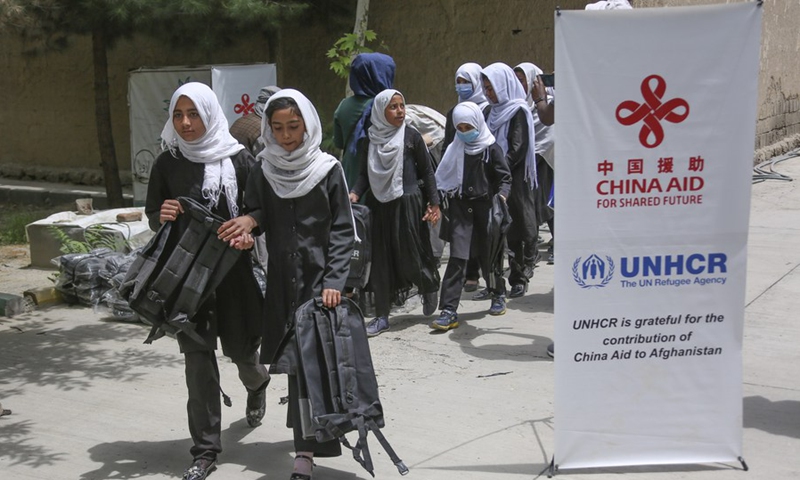
Afghan school children receive backpacks provided by China's South-South Cooperation Assistance Fund in cooperation with the United Nations Refugee Agency (UNHCR) in Kabul, Afghanistan, May 9, 2022. Photo: Xinhua
"The World Refugee Day lasts only one day, but the refugees have to deal with their plight everyday," Wang Wenbin, spokesperson of China's Foreign Ministry, said in a press conference on June 20, noting that China urges those countries that have long exported war and turmoil to earnestly reflect on the grave impact of their behavior, eliminate the root cause of the refugee issue and step up to their due responsibilities.
After the US invasion of Afghanistan, not only did the local population starve and freeze, but more seriously, it destroyed the local's belief in democracy and human rights, Habibtullah, a middle school English teacher based in Kabul, told the Global Times.
"When the US hastily withdrew from Afghanistan and brutally imposed unilateral sanctions, it was the actual arrival of rice donated by China that deterred our family of five from leaving Afghanistan." Habibtullah said.
The Chinese government announced in September 2021 that it would provide emergency humanitarian aid to Afghanistan in the amount of 200 million yuan ($29.8 million) in food, winter supplies, COVID-19 vaccines and medicines, Xinhua reported. Currently 6,220 tons of food aid have been delivered under the program.
While the invasion of Iraq by the US on trumped-up charges caused estimated 200,000 to 250,000 civilian deaths, the construction of 1,000 schools with Chinese aid recently began in full swing.
According to the Emirati media National News, Iraqi Prime Minister Mustafa Al-Kadhimi said on June 21 that his government is moving forward with a multi-billion dollar strategic agreement with China.
This project that will involve Chinese companies building 1,000 schools across Iraq is "the first stage within the deal with China, and there are more schools to come and we will continue implementing some projects within that deal," the minister said.
Looking back at the Iraq War in 2013, the US-led coalition extensively used depleted uranium bombs, cluster bombs and white phosphorus bombs. The UN estimates that Iraq still has about 25 million landmines and other ordnance that need to be removed today.
In contrast to Western troublemakers who allow the problems caused by refugees to spill over into neighboring countries and regions, China has been pragmatic in its humanitarian assistance to support its neighbors and partners. At the same time, China has further promoted regional peace and social stability under multilateral mechanisms to try to solve the conflict at its source, Zhou noted.
China is ready to work with the international community, firmly support multilateralism, play a constructive part in improving global refugee protection system and work to address the refugee issue, Wang said on June 20.
